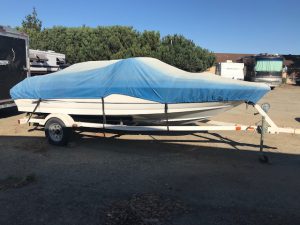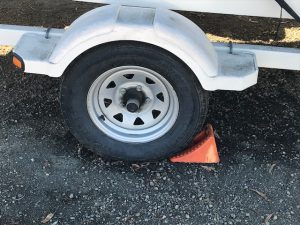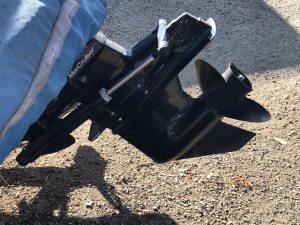Winterizing Boats
Your boat is your most expensive piece of fishing equipment. At the end of every fishing season, be sure to winterize your boats. Proper winterization makes spring launching easier and saves your boat from damage while sitting.

Winterizing Boats
Storing the Boat

Thoroughly clean your boat, inside and out, before being stored for the winter. This is particularly important if it sat in the water all summer. In fresh water, algae can grow on the hull. Floating dirt gets caught in the algae. If not cleaned, the hull will eventually stain. Salt water can eat away metal fixtures and damage unprotected fiberglass and wood.
You might find a summer’s worth of beer and food covering your boat. There are mud and sand deposits everywhere. Often water saturates floor boards or carpet. Food and beer can stain the floor and upholstery. Moisture can cause mildew.
A pressure washer with boat detergent will do the trick. Before washing, remove the drain  plug. Rinse the boat with water. Soap the boat in and out. Scrub the boat and rinse again. Let the boat dry completely inside before covering it for the winter. Tilt the bow of the boat up slightly to allow the wash water to drain after cleaning and to allow rain water to run off more easily if stored outside.
plug. Rinse the boat with water. Soap the boat in and out. Scrub the boat and rinse again. Let the boat dry completely inside before covering it for the winter. Tilt the bow of the boat up slightly to allow the wash water to drain after cleaning and to allow rain water to run off more easily if stored outside.
Preparing Your Trailer
Whether your boat is stored inside or outside, you should look after the trailer. Block at least one wheel of  the trailer. Because boat trailers move fairly easily on a trailer, blocking will reduce the risk of accidentally pushing the trailer into another rig.
the trailer. Because boat trailers move fairly easily on a trailer, blocking will reduce the risk of accidentally pushing the trailer into another rig.
Even if your boat is stored indoors or outdoors in a fairly secure place, install a trailer lock. This can be a cable locking a wheel or a hitch lock. Thieves can remove both types of locks with some effort. No lock at all makes stealing your boat and trailer just too easy.
If you have access to your boat, while it’s being stored, open the cover from time to time allowing the boat to “air out.” If your boat is exposed to the elements during storage, condensation can form on the inside of the boat cover causing mildew on the cover and the boat interior.
Storing Your Motor
Whether you have an outboard, a direct drive or an IO, prepare it for storage. It’s a good idea to drain the engine block on water cooled motors. This is a must in cold climates. Many newer models have easy disconnect hoses that allow for quick draining. Older engines have drain plugs on the bottom of the block preventing sediment and rust from causing problems.
 Drain the lower unit on an IO or an outboard. Install engine oil to prevent rusting if needed. Remove the spark plugs to put sewing machine oil on the cylinders Worked the oil into the cylinders to present seizing. The lower unit should not touch the ground. This can prevent accidental damage if the boat is moved. But, Don’t leave the lower unit fully trimmed because of the tension put on the trim mechanism over the months.
Drain the lower unit on an IO or an outboard. Install engine oil to prevent rusting if needed. Remove the spark plugs to put sewing machine oil on the cylinders Worked the oil into the cylinders to present seizing. The lower unit should not touch the ground. This can prevent accidental damage if the boat is moved. But, Don’t leave the lower unit fully trimmed because of the tension put on the trim mechanism over the months.
An appropriate additive should be used to preserve what gas is left over from the summer.
Winterizing Boats – Tips and Tricks
- Be sure to remove any equipment from your boat or any unattached pieces on the trailer.
- Place a bungee cord from one cleat to another under the lower unit to relieve pressure on the trim.
- Remove the battery and store it in a warm dry place, off of cement.
- Place old (clean) shop rags cover pointed edges on the boat to preserve the cover.
- Use your imagination 3/4″ PVC pipe to build a stand to hold up the boat cover.
- If you do lock your trailer, make sure that the storage facility has a key.
A boat is a big investment. If it needs major cleaning or work when you are ready to fish, it becomes a big frustration. If you know how to winterize a boat and do it properly, the start of boating season will be much more fun.
Share your thoughts winterizing boats in the comment section below. What works for you, will work for others.

 class="post-template-default single single-post postid-1535 single-format-standard">
class="post-template-default single single-post postid-1535 single-format-standard">

12 thoughts on “Winterizing Boats”
We hear a great deal about fishing in the lochs over there particularly for salmon. I hope the tips are helpful. Thanks for taking the time to comment.
Very helpful and informative article which I will be sharing with my husband and son. They are both boat enthusiasts and go out on the lochs in Scotland when they get the chance. I don’t have a clue about it myself but the tricks sound useful and it does get kind of cold here in winter so it will be interesting for them. Cool site!
Happy Boating! Thanks for commenting.
I love fishing, but even for those who may not be fishermen, a boat is still something great to be looking to buy! It is always worth the buck. And you have provided multiple options for us all to be looking into so I definitely appreciate that a lot. Thank you so much for this article and for the info you have provided for us
Thanks for reading the article and taking time to reply.
Boats are fun, but they are work. Its a big investment so it needs to be maintained and used. Thanks for taking the time to comment.
I use a cover with a vent in the bow and stern, but, at least in the California climate, I have to remove the cover periodically to prevent mildew. I don’t know anything about the ventilators for covers, but pinhole vents probably aren’t enough in my opinion. Its the moisture stuck under the cover that causes the problems. Thanks for the question.
I have read on other posts that some companies have begun to market ventilators to be installed in covers. But I think that having pinhole-sized “vents” is enough. I would like to hear your opinion on this. I have also heard that polyethylene covers give plenty of ventilation without the work and cost of installing vents. What do you think?
Thanks in advance.
Hello James, this is something that I find to be very good because I have been thinking of getting my own boat but I understand that there is more to taking care of it than just storing somewhere safe and now I get the word winterize. I should definitely take to your advice when I eventually get that sleek boat.
Hello there, thank you so much for sharing this. this is a very awesome piece and a very detailed one. I’m really happy I came across this. Reading about this article winterizing boats tips tricks sounds really exciting. Going through this article was indeed helpful and informative. I enjoyed reading this article
Thanks for your comment. I will send over the names of additives I have used. I didn’t put them in the article just in case my suggestion doesn’t work.
I really appreciate the detail you went into here with your tips for storing a boat. Growing up, I always helped my dad when it came time to winterize his boat, but I didn’t know all the ins and outs. I was curious if you had a list, or a suggestion as to what the best additive would be to preserve the remaining gas? Thanks for any help you can provide.
Comments are closed.